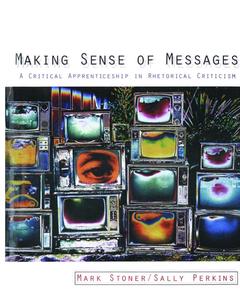Description
Making sense of messages (1st ed )
A Critical Apprenticeship in Rhetorical Criticism
Author: Stoner Mark
Language: English
Keywords
analyst, apprenticeship, choices, clinton's, critical, criticism, pattern, president, rhetorical, rhetor's
Approximative price 202.33 €
In Print (Delivery period: 13 days).
Add to cartPublication date: 08-2017
· 23.5x19.1 cm · Hardback
Approximative price 61.75 €
Subject to availability at the publisher.
Add to cartPublication date: 10-2004
368 p. · 19.1x23.2 cm · Hardback
Description
/li>Contents
/li>
I. Introduction
1. What Are Rhetorical Messages?
Characteristics of Rhetoric
Definition of Rhetoric
Rhetorical Terminology
Why Study Rhetorical Messages?
2. Criticism: What Critics Do with Rhetorical Messages
Reaction versus Critique
Characteristics of Critics
A Critical Stance: In the Balcony
How This Book Can Help
Message Analysis Matters!
II. Process to Product
3. Four Kinds of Critical Thinking
Creative and Critical Thinking
The Process of Critical Analysis of Messages
Notes
4. The Process of Description
Approaches to Describing a Text
Recording Your Thinking
Approaches to Describing Context
Conducting Relevant Research
Text-Context Interaction
Applications of Text-Context Interactions
Notes
5. The Process of Analysis
Naming the Parts of the Message
Looking for Rhetorical Patterns
Sample Analysis
Deriving Questions from the Analysis
Notes
6. The Process of Interpretation
Characteristics of Interpretation
How Does a Critic Develop an Interpretation?
7. The Process of Evaluation
Types of Judgments
Selecting a Type of Judgment
Sample Evaluation
8. Writing Your Ideas
Effectively Arguing Your Claims about Messages
Documenting Your Sources
Notes
III. Analytical Tools
Classical Approaches
9. Classical Approaches: Ancient Rhetoric
Some Classical Rhetorical Concepts
The Classical Model Applied
Notes
Suggested Readings
10. Classical Approaches: New Rhetoric
Toulmin and Everyday Argument
Perelman and the New Rhetoric
The New Rhetoric Applied
Notes
Suggested Readings
Dramatistic Approaches
11. The Narrative Paradigm
Some Vocabulary of the Narrative Paradigm
Narrative Paradigm Applied
Two Concepts-Four Concerns
Narrative Applied to WWF Smackdown!
Suggested Readings
12. Fantasy Theme Analysis
Fantasy Theme Analysis Contrasted with Narrative
Some Basic Concepts of Fantasy Theme Analysis
The Process of Fantasy Theme Analysis
Fantasy Theme Applied: Gettysburg Address
The Fantasy Themes of WWF Smackdown!
Notes
Suggested Readings
13. Burkeian Analysis
The Negative and Human Speech
The Pentad
Two Examples of the Pentad Applied
Using Pentadic Ratios
Discovering Motives
Burkeian Concepts Applied to WWF Smackdown!
Notes
Suggested Readings
Sociopolitical Approaches
14. Ideological Approaches
Critical Theory
Hegemony and Marginalization
Legitimation
Naturalization
Ideological Concepts Applied to Beauty and the Beast and Shrek
Notes
Suggested Readings
15. Feminist Approaches
Liberal Feminism
Cultural Feminism
Postmodern Feminism
Feminist Concepts Applied to Beauty and the Beast and Shrek
Notes
Suggested Readings
16. Postmodern Approaches
Deconstruction
Ideographs
Discursive Formations




